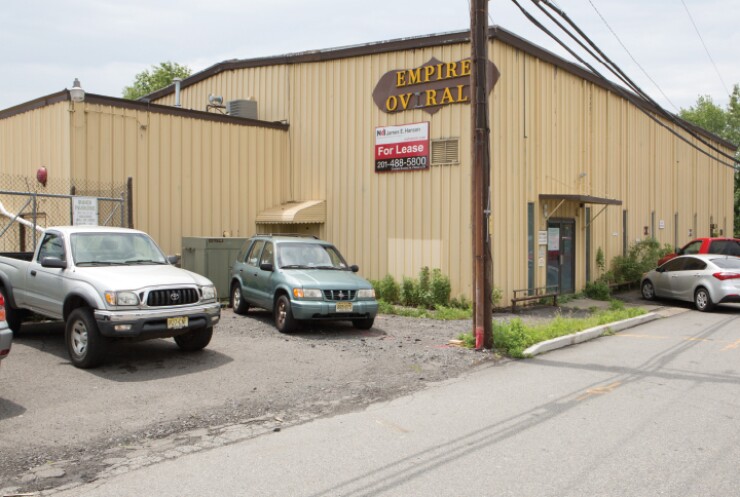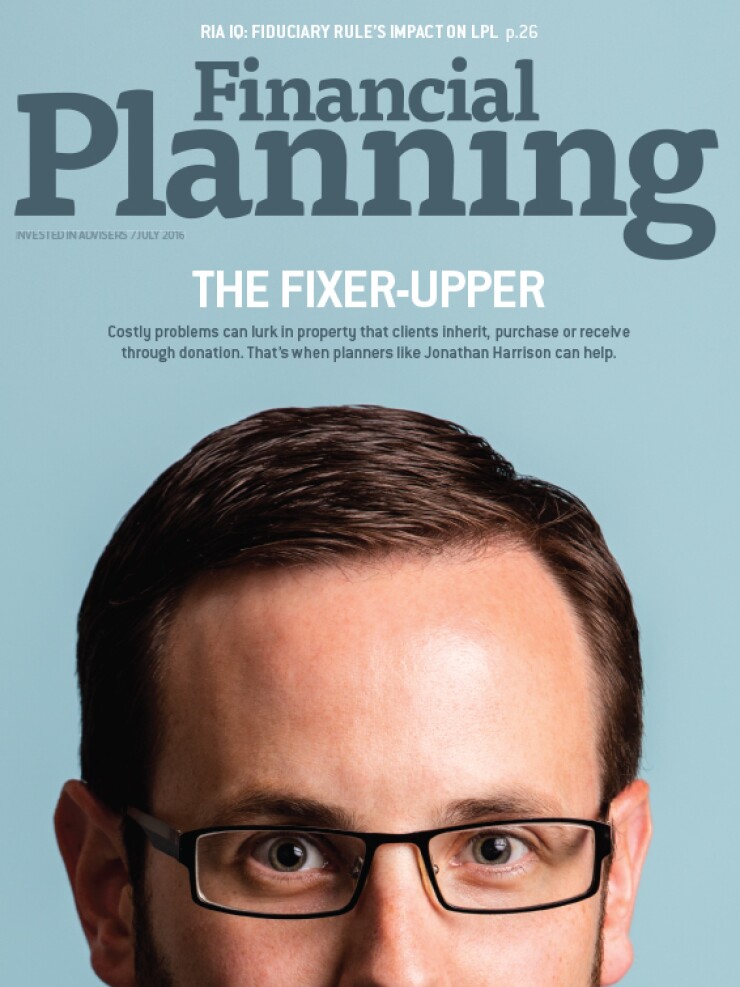It started as a simple estate plan. The couple, in their early eighties, wanted their three sons to inherit three pieces of land, all with low cost bases and — they thought — equal values.
Then their financial advisor, Morgan Stanley family wealth director Anouchka Balog, noticed that an auto repair shop had once operated on one of the properties. Was the land contaminated with petroleum products? (It was.) Would the heir be able to sell it? (No one knew.) How much less than the initial estimate might the property be worth? (That was difficult to say.)
After meeting in Balog’s office in Laguna Niguel, California, the family decided to sell the property during the parents’ lifetimes, despite the taxes they would pay on the profits, in order to hand over a known quantity to their sons.

“The cleanup turned out to be minimal and they got a good sale price on the property,” Balog says. “They were very happy we brought up the possibility of contamination, because no one else had thought to ask the question.”
THE ‘TOXIC SUCCESSION’ PROBLEM

In asking about the property’s history, Balog put herself in a minority, says Kevin J. Daehnke, of the Daehnke Cruz Law Group in Newport Beach, California. He has spearheaded a campaign to raise awareness of a problem that he calls toxic succession.
The U.S. has laws and procedures to protect those who buy and sell property that could be contaminated, but there is little that protects heirs. As a result, “financial and legal advisors don’t often talk to clients about the danger of passing contaminated property from one generation to the other,” Daehnke says. “Property passes haphazardly from generation to generation in almost all circumstances, especially with properties where the contamination isn’t already known.”
That can leave heirs holding the bag for an unanticipated environmental cleanup — and, Daehnke says, can also leave financial service providers liable.
Even a charity might take a hit if it accepts polluted property as part of a bequest, says Jonathan Harrison, an adviser at Sound Stewardship in Overland Park, Kan., who works with both charities and prospective donors.
TAG — YOU’RE IT!

No one else had thought to ask the question
The problem’s root is the federal Superfund law that makes current and past owners and operators jointly and individually liable for contamination, says Polly B. Jessen, a partner at Kaplan Kirsch Rockwell in Denver. “Current owners are always responsible for the contamination,” she says. “If it’s on your property and it’s a hazardous substance, you’re responsible for cleaning it up.”
For example, Daehnke says, “You buy a property, and 40 years ago it was a gas station. The tanks are underground and leaking. You didn’t know about the problem when you bought the property. The contamination is discovered later when you try to sell it. You didn’t cause the contamination or rent the property to someone who did. The government can still say 'Tag! You’re it.'”
DON’T FORGET THE NEIGHBORS
In addition to whatever the government requires, a polluted property’s neighbors may also sue the source property’s owners for the cost of cleaning up pollution on their land, as well as for health problems, diminished property values, medical monitoring costs or other damages, Jessen says.
The original property’s owner can also sue the prior owner or operator, particularly if they owned or operated the property when it was first contaminated — but that person or company might be hard to find, dead, or long out of business.
Depending on individual state laws, a contaminated property’s owner may not have to clean it up right away. “But as soon as you dig into that waste on your property, you are subject to all the rules for proper disposal,” Jessen says. “If you manage that badly and create an imminent and substantial danger, the law gives private properties the ability to sue you to clean up the mess you made.”
SELLING A TOXIC INHERITANCE
An heir may be able to sell a contaminated inheritance, though almost certainly for a lower price than the cleaned-up property might bring. Or the new owner may have to clean up the property in order to sell it.
Tim Gilmore, a financial planner for Prudential Advisors in Irvine, California, has a longtime client who bought a Los Angeles-area house as-is at auction, then decided to resell it. “He noticed that the basement floor was rising up in the middle,” Gilmore says.
The house, located just a few miles from the La Brea tar pits, was built on an old oil well, and tar was bubbling up from that old well. A previous owner had used a telephone pole and concrete to plug the oil well, but it didn’t stay capped. “In order to sell the house, he had to come up with $100,000 out of his own pocket to recap the well and restore the basement — about $80,000 for the work and another $20,000 in legal fees. The buyer reported the whole thing to the city to ensure that the seller would fix everything,” Gilmore says.

UN-CHARITABLE DONATION?
If a client plans to leave a polluted property to a charity, selling it and donating the cash may be the best plan, even if that means paying for cleanup, taking a capital gains hit or paying more estate tax.
Many charities refuse properties that may have pollution problems. Other charities might have ways to benefit from the donation. Farms, for instance, are relatively easy to sell, even with pollution issues.
“A farm might have buried gas tanks or storage for pesticide. Farmers generally know about and aren’t concerned by those issues, as long as they think the land is productive,” Harrison says. A charity that plans to put a new building, such as a church or expanded animal shelter, on donated land might also be in the clear.
But in most situations where a nonprofit must sell the property to benefit, Harrison suggests skipping the bequest or donating in another form. “If it’s a cause that you care about, you’re not doing it a service by giving them a property that you think might have a problem. If there’s a risk, it’s best to deal with it ahead of time,” he says.
He recalls a client who wanted to donate a commercial property where a dentist’s office might have stored a toxic chemical. “This guy ended up selling the building, disclosing that the dentist’s office may or may not be an issue,” Harrison says. The client then donated the proceeds.
WHAT’S IN THERE, ANYWAY?
As clients consider estate plans, it’s important that advisers ask about whether a property may be contaminated and the possible extent of the pollution, Daehnke says. The first place to look is in the property’s history. If it’s the current or past home of a dry cleaner, junk yard, auto shop, gas station, rail yard, mine, or other industrial concern, there’s a good chance that the site is contaminated.
Walking around the site is the next step. What do you see and smell? Chemical odors, metal drums, and old machinery all suggest pollution. Jessen says that a contaminated site can house an active business or look vacant because old buildings have been demolished. “Setting aside sites with active operations (and environmental compliance requirements), environmental contamination is usually in soil and/or water,” she says. “Air contamination is also a possibility.”
Sending soil, water, or air samples for laboratory analysis comes next. That can open reporting requirements, which vary by state and can, in turn, trigger cleanup obligations. Colorado, for instance, requires owners to report petroleum contamination of more than a particular amount, asbestos, and active toxic releases to groundwater or surface water. “People often decide what they’ll test for and prepare for what they’ll do about whatever they find. Maybe they don’t test for asbestos. Or they might decide that they’ll do the minimum required,” Jessen says. “You can still make some educated guesses about what the likely bounds of cleanup costs might be.”
WHO PAYS FOR CLEAN-UP?
Cleaning it up yourself is the gold standard for dealing with contaminated properties, says Paul Moe, a partner at Faegre Baker Daniels in Minneapolis, and cleanups don’t get cheaper when you wait. But the current owner may not have the funds or liquidity to do the job.
That leaves several choices. “Sometimes if you’re lucky and an oil company owned a gas station, you can get them to step up,” Daehnke says. “Some states have cleanup funds specifically for underground petroleum storage tanks,” he adds. In addition, Moe says, some states, counties, and cities have available cleanup money because they want to see contaminated sites redeveloped.
If those aren’t possible solutions, a property owner might set up funds that will allow heirs to get rid of the contamination, either through a life insurance policy or by leaving the heir who receives the polluted property additional assets.

In addition to life insurance, “the other vehicle people often use is pollution liability insurance,” Jessen says. “Environmental insurance policies are intended to pick up all the sources of liability you might have.” You can use a historical investigation and noninvasive site inspection as the basis for a policy, though if you know about specific contamination, a policy may no longer be an option. “The longest terms available right now are about 10 years. If you’re looking at estate planning in your eighties, that might be the mechanism you use to protect your family,” Jessen says.
EXISTING INSURANCE
Existing insurance may be another option. Stephen Craffen, a partner and senior wealth manager at Stonegate Wealth Management in Oakland, N.J., says his wife inherited a New Jersey uniform-rental company from her father, who inherited it from his father, the company’s founder. The firm used dry-cleaning fluid in the 1970s.
“The property probably had zero to negative value without cleanup. The potential remediation costs were maybe $1 million, and it had been suggested to disclaim the property at her dad’s death,” Craffen says.
Fortunately, the firm had comprehensive business insurance in the 1970s that covered pollution remediation, Craffen says, adding that, so many years later, “the company tried to duck the responsibility.”
After the family threatened a lawsuit, the insurance company agreed to cover 80% of the cleanup. “Our share cost about $200,000. Now we have a potential buyer, and the money we spent will be added to the basis, as a passive loss against capital gains from selling the place,” he says.
SELLING WITHOUT CLEANING

The current owner might also talk with heirs about selling the property without cleaning it up, which state law may allow. “There’s no rule against selling a contaminated site, but it’s a risky business,” Moe says, because selling the property doesn’t eliminate the liability. Purchasers will be warier than they would be of other properties, but many contaminated sites are still marketable. “It affects the value, but might not put someone in the poorhouse,” Moe says, adding that he hasn’t seen a site that’s cost more to clean up than it was worth.
An owner who is unsure whether a property is contaminated or how much it might cost to clean up may want to segregate the asset from the rest of the estate, Daehnke says. “To err on the cautious side, consider putting it in a separate trust where your heirs are not the trustees, so your heirs are not the automatic owners,” he says. Depending on the situation, that may give heirs time to consider how they want to handle the property. Independent trustees get statutory protection; insurance may give them an extra layer of security.
If all else fails, there’s a nuclear option for properties that are worth less than they’ll cost to clean up. “You can always disclaim things that someone has willed to you,” Moe says. Good advance planning can help ensure that this is unnecessary.





